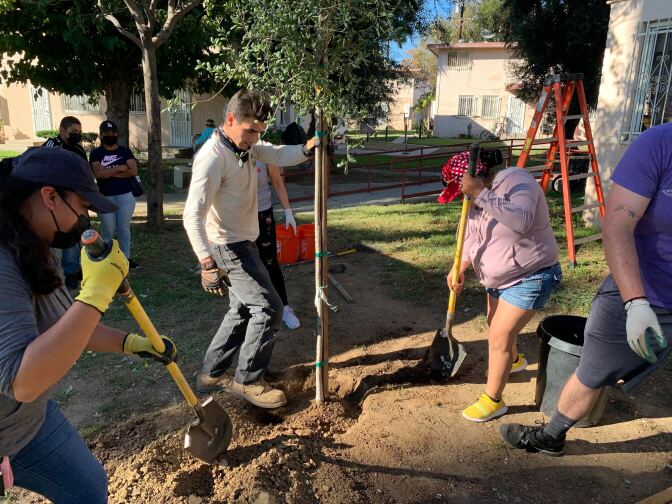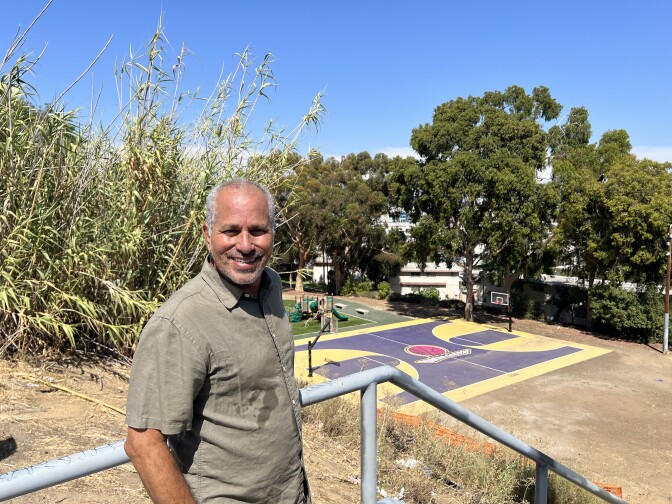This story is free to read because readers choose to support LAist. If you find value in independent local reporting, make a donation to power our newsroom today.
Thousands of trees will go unplanted in Los Angeles after Musk pulls funding

Tree planting programs across the U.S. are on the chopping block as a result of federal funding cuts under the billionaire Elon Musk-led Department of Government Efficiency.
The cuts include $75 million to the U.S. Forest Service, $1 million to nonprofits in Nashville and $12 million to Philadelphia.
In Los Angeles, thousands of trees may now go unplanted.
“We’re taking a hit somewhere to close to $2.5 million, which for a small nonprofit is a big deal,” says Aaron Thomas, director of urban forestry for North East Trees.
North East Trees is a tree-planting nonprofit that primarily operates in low-income communities in Los Angeles like Watts, Boyle Heights and Northeast and South L.A. They build parks, run cleanup events in the L.A. River and plant thousands of shade trees.
“Between 80 and 90% of our budget is from government grants,” Thomas said.
This year’s funding is largely spoken for thanks to grants from CalFire, but since “the Biden administration secured so much funding for urban greening, California decided to not use their own funding for these kinds of programs going forward,” he added.
North East Trees applied for federal grants for 2026, which Thomas says were approved. But with federal dollars gone, Thomas and his team will run out of funding by the end of this year.
That will mean abandoning projects to plant 1,000 trees in Watts and another 1,000 trees in eastern unincorporated L.A. County, Thomas said.

A loss of essential infrastructure
Research has shown that people living near fewer trees die earlier.
One study found that just three trees can lower the chance of health-related deaths by 1%. With adequate funding, nonprofits like North East Trees can plant several hundred trees in an afternoon.
“If we can't continue to regenerate and rejuvenate our urban forests, we're in deep trouble,” said Esther Margulies, a professor of landscape architecture at USC.
Trees are essential city infrastructure.
“Trees are essential pieces of our city's infrastructure,” she said. “They do everything from providing cooling, to retaining storm water, to supporting habitats, to promoting physical and mental health.”
Marguiles said the parts of Los Angeles with the fewest trees tend to be lower-income, and would feel the federal budget freezes the most.
“People who depend on transit, people don’t have air conditioning, kids walking to school in the morning… These people really need shade,” she said.
But the benefits of increased tree canopy are universal, she added.
“When temperatures rise and there is more heat, we see more chemical reactions that increase ozone and other substances that are harmful to our health,” Marguiles said, adding that some trees are able to also absorb some of these chemicals. “So the cooler we make our environment, the more we fight the urban heat island, the better our air quality will be.”

‘A ricochet effect’
Millions of dollars of lost grant funding affects more than just the trees themselves.
North East Trees hires people in the communities where they work. And they purchase most of their trees from a nursery in Watts, supporting the local economy.
There will be a ricochet effect across all of our partners.
It’s not just North East Trees, Thomas said.
“The larger urban forestry community and other nonprofits, L.A. city, all of them are taking hits," he said. "Collectively, there will be a ricochet effect across all of our partners.”
Thomas said he anticipated budget cuts in the wake of President Donald Trump’s return to office. But, he added, when the cuts were announced, “it was shocking nonetheless.”
“Real people's lives — vulnerable people — will be hurt unnecessarily," he said. "That should not be okay with anyone."
Despite losing nearly 90% of their funding for next year, Thomas said their mission is as important as ever. He hopes private funding and state partnerships can make up some of the losses.
“We just have to work through this to make sure that our communities here in Los Angeles have the quality of life that they deserve,” he said. “Act locally, think globally. We can't let anything prevent us from doing that.”







